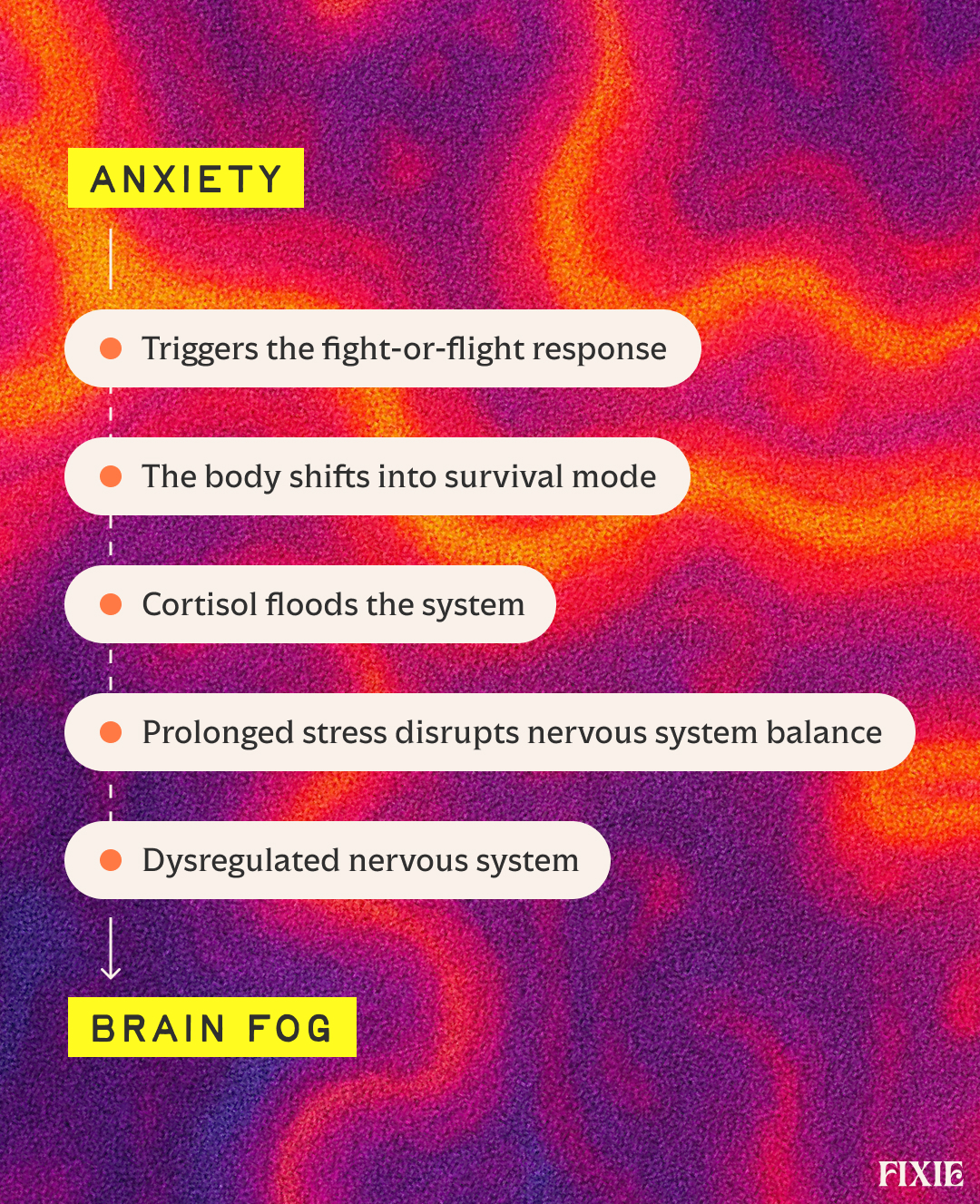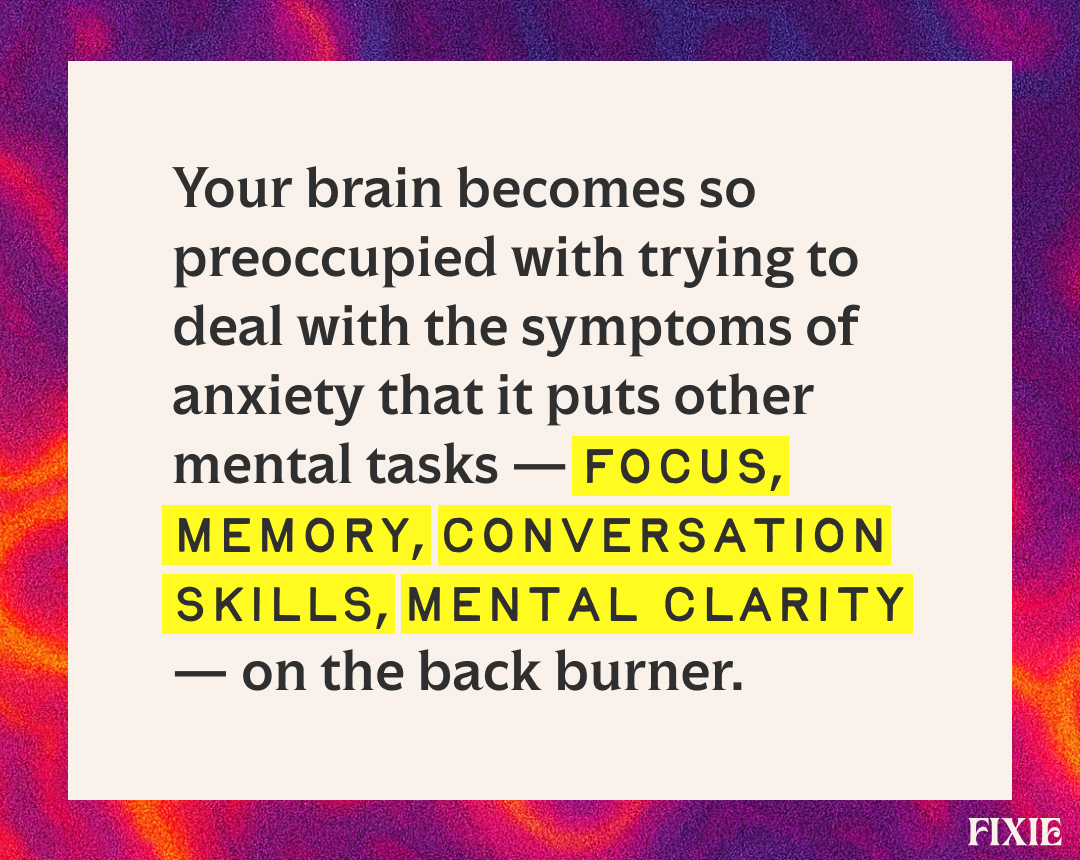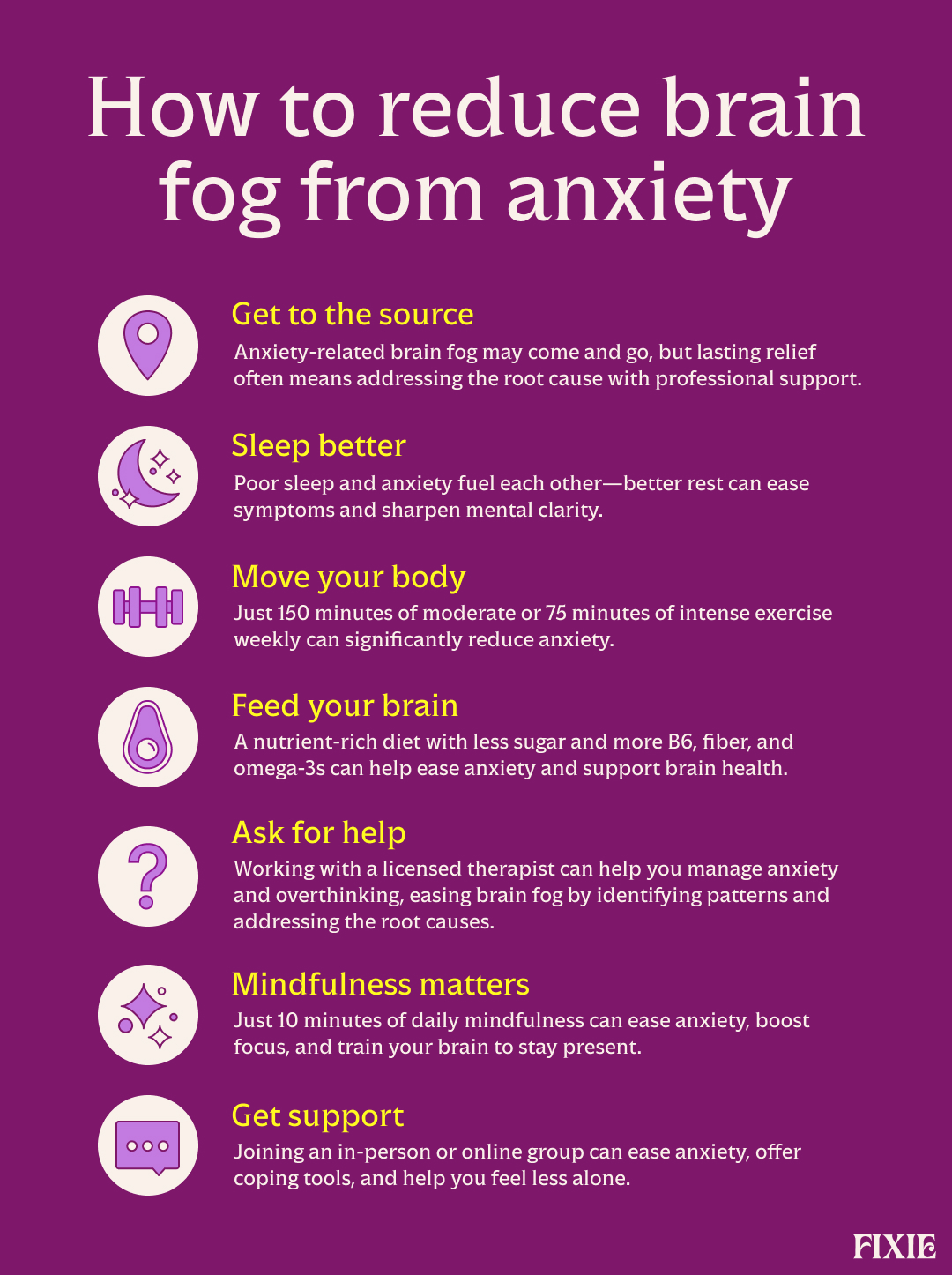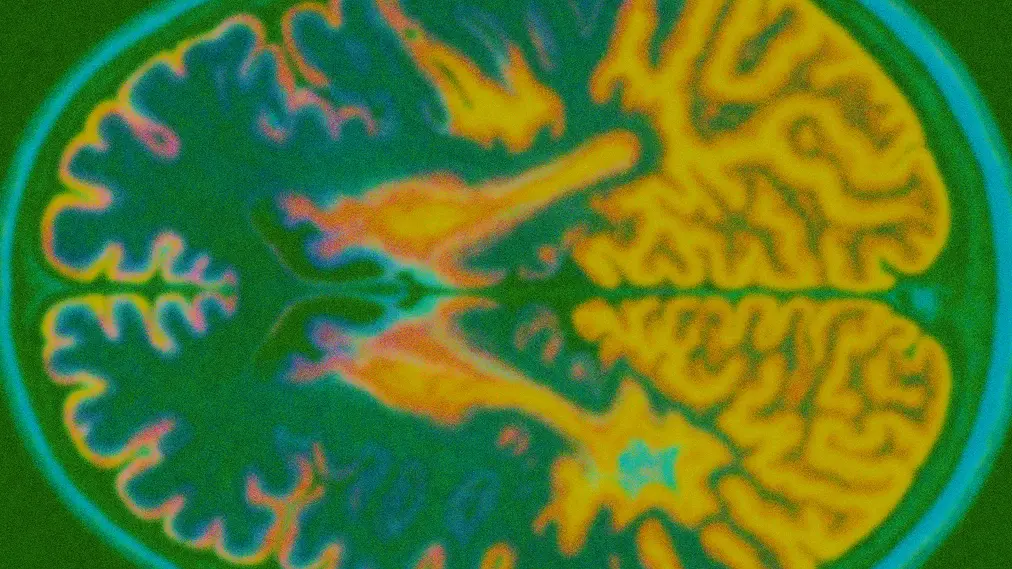Anxiety and Brain Fog: What’s the Link?

Anxiety and brain fog make a terrible duo, but each one influences and can even induce a bout of the other. Here’s how these two conditions are intertwined, and what you can do to deal with them.
Anxiety is no joke — and definitely no fun (been there). There are the mental symptoms, of course: the worry and dread about what could maybe, possibly, potentially happen and the overthinking of every word and action of yours and others. And then there are the physical symptoms: the sweaty palms, fluttery stomach, pounding heartbeat, and wiped-out fatigue from poor sleep.
People with anxiety often experience hyperarousal and hypervigilance, explains Claudia Giolitti-Wright, M.A., L.M.F.T., a licensed marriage and family therapist and the founder and clinical director of Psychotherapy for Young Women. Your mind acts like it’s on patrol, constantly on alert and scanning for danger or things that will ramp up your stress. Your brain may be trying to manage intrusive or upsetting thoughts, or it gets stuck in a rumination loop (AKA overthinking). Over time, Giolitti-Wright says, all of this extra work can drain your mental resources.
Enter brain fog. Anxiety symptoms actually overwhelm the brain, leaving you feeling hazy, scattered, spacy, and unfocused. Ever been knocked over by a wave at the beach? It can feel a little like that. That brain fog can make anxiety feel even worse if your memory is shaky and your concentration is shot at work or at home. It’s enough to make you feel as if anxiety and brain fog are tag-teaming against you.
Clinical health psychologist and a clinical assistant professor Hannah Holmes, Ph.D., sees the link between the two regularly in her clients with anxiety. “This loop will start happening where they're almost hypervigilant about the brain fog, too,” she says. “As soon as they start feeling like, ‘Oh, my word-finding is slipping a little bit,’ it's making them nervous, and that creates this loop of feeling even more mentally discombobulated and more scattered.”
It can be a vicious cycle, but it’s one you can break. If you’re dealing with anxiety and brain fog, here’s what you should know — and what might be able to help bring on some calm.
How anxiety causes brain fog
When we have anxiety, the body behaves as if we’re in danger, triggering a cascade of changes in the brain and in the body. Anxiety activates our sympathetic nervous system (SNS), which is responsible for our “fight or flight” response.
In the brain, the amygdala senses a stressor and sends a message to the hypothalamus. The hypothalamus sounds the alarm that we need to either run away or to fight like hell, and that triggers the release of stress hormones norepinephrine and epinephrine (AKA adrenaline) to help.
And it’s not just happening in your head. Our entire bodies ready themselves to fight or flee. Our pupils dilate so we can see better. Airways in the lungs open so we can breathe in more oxygen. Our hearts beat faster to move that oxygen through the body more quickly. Digestion slows so we can focus on facing or running from danger, not hunting for a bathroom. Blood flow gets diverted from the brain and digestive system to the muscles.
Cortisol, another stress hormone, is released by the adrenal glands. Cortisol keeps us alert and awake and sends glucose through the bloodstream to fuel our muscles to run, kick, or punch. And all of this happens in the blink of an eye.
In short bursts, this is a good thing. Our survival literally depends on it. But if the stress never really goes away or if our anxiety keeps us dialed up to 11 all the time, our brains and nervous system become dysregulated. And brain fog is one of many symptoms that reflects this dysregulation, Giolitti-Wright says.
The SNS is one part of our autonomic nervous system (ANS), which controls important bodily functions that happen automatically, like breathing, heart rate, and digestion. The other half of the ANS is the parasympathetic nervous system (PNS), which is responsible for returning us to the “rest and digest” phase. The PNS takes over to “reset” after the danger or stress has passed.
When we’re coping with anxiety or another mental health disorder—or even chronic stress —the SNS remains in a heightened, hyper-alert state. Prolonged fight-or-flight keeps stress hormones pumping and impacts many functions and parts of the body, including our sleep, digestion, fertility, blood sugar levels, and brains. This is why stress and brain fog go hand in hand.

Can stress and anxiety cause brain fog? Most definitely. Giolitti-Wright explains how:
- Chronic stress and the high cortisol that comes with it affect the brain’s hippocampus and prefrontal cortex. These areas are critical for memory, learning, and concentration. While some research has found cortisol that accompanies short moments of stress can actually help with memory formation (like when you’re prepping for a big presentation), chronically high cortisol levels can have negative effects on brain health.
- Hypervigilance directs our mental energy to threat detection, leaving less bandwidth for problem-solving and decision-making—or even simply holding a conversation.
- Rumination clutters mental space. When we’re constantly replaying and overthinking every word we said to someone we met at a party, every text exchange with a friend, every email from our boss, the brain doesn’t know where to direct its focus. “The brain literally struggles to filter what matters and what to pay attention to,” Giolitti-Wright says.
- Cognitive overload tends to show up when a person is juggling anxious thoughts with the merry-go-round of basic daily demands: email-replying, permission slip–signing, grocery-shopping, dinner-making, bill-paying, to-and-fro driving.
What are the signs of brain fog due to anxiety?
Brain fog commonly accompanies untreated anxiety, explains Saira Bhatti, M.D., a board-certified psychiatrist and psychotherapist based in New York City. “If you’re having multiple panic attacks a day and focusing a lot of your bandwidth on the panic attacks—avoiding them, overcoming them, preventing them—it can take a huge toll on the brain’s capacity to focus on other things,” she says.

In order to determine if your brain fog is anxiety-induced, pay attention to what’s happening in tandem with the brain fog. “If mental cloudiness shows up during or after periods of high stress, poor sleep, or emotional overwhelm, that’s usually a good clue,” Giolitti-Wright says. “Anxiety-related brain fog often goes hand-in-hand with racing thoughts, tension in the body, disrupted sleep, and a feeling of being ‘on edge’ all the time.”
In short: Your brain becomes so preoccupied with trying to deal with the symptoms of anxiety that it puts other mental tasks — focus, memory, conversation skills, mental clarity — on the back burner.
Similarly, if the fog seems to lift as anxiety improves, it’s a strong sign they’re linked, the experts say.
How to Reduce Brain Fog & Anxiety
Both brain fog and anxiety are treatable. It may take some trial-and-error to find what works for you, but neither one has to feel impossible forever.
- Find the source: Anxiety-induced brain fog may wax and wane, but it probably won’t go away for good until you actually treat the anxiety, Giolitti-Wright says. A therapist or other healthcare provider can help you dig down to the root of the problem, provide a diagnosis, and work with you to develop a treatment plan.
- Better sleep: Not getting enough sleep does more than just make our bodies feel tired — it actually affects our brain function, memory, and ability to concentrate. It can also make anxiety symptoms worse. Unfortunately, crappy sleep is super-common with anxiety. Roughly 50% of people who have anxiety suffer from insomnia and other sleep problems. Prioritizing sleep can go a long way to easing anxiety and making the brain feel more clear.
- Physical activity: Research has found exercise can reduce anxiety (nothing burns off anxiety quite like Peloton and Pilates, IMO). In fact, some research suggests exercise may even be more effective at easing symptoms of depression, anxiety, and stress than some commonly prescribed medications. The Centers for Disease Control and Prevention recommends getting at least 150 minutes of moderate-intensity or 75 minutes of high-intensity exercise a week (or a combo of the two).
- Improved diet & nutrition: A nutrient-dense diet can fuel the brain and body with the macros and micros they need to perform their best. Consuming too much added sugar, caffeine, or ultra-processed foods can increase the risk of anxiety. On the flip side, certain foods that are rich in particular nutrients may lower the risk of anxiety: vitamin B6, fiber, protein, flavonoids, and omega-3 fatty acids.
- Therapy: A licensed therapist can provide tools to help manage anxiety and overthinking, which may in turn improve your brain fog. “Through psychotherapy, challenging anxious thoughts and situations that bring about intense anxiety can lead to exploration and discovery of the root of anxious thoughts,” Bhatti says.
- Mindfulness: You don’t have to sit silently pretzeled into a lotus pose for an hour to feel the benefits of a mindfulness or meditation practice. Research has found just 10 minutes a day of mindfulness practice can decrease anxiety. Try doing breathing or relaxation exercises or doing a short guided meditation. “Mindfulness or meditation is super-helpful,” Holmes says. “Not only does it help with stress-management, but it can also help you, quite literally, train and become more skilled or more practiced in directing your attention and staying focused on the things you want to focus on.”
- Support groups: Research has found joining an in-person or online group to talk, listen, and offer support to other people with anxiety can help you feel less alone, reduce symptoms of anxiety, and provide valuable coping tools.

When to Seek Medical Attention
It can be tricky to know if your brain fog is temporary and will go away on its own or if you should talk to a doctor about it. The rule of thumb? If the brain fog starts to interfere with your life at home or at work, with friends or with family, it’s time to talk to someone about it.
“If it's like an ongoing concern, like you're feeling brain fog that's been persisting long enough or severe enough that it's impacting your day-to-day life, it would be reasonable to talk to a doctor,” Holmes says.
But sometimes loss of concentration and memory can indicate something more serious than brain fog. “If it's very sudden — like you have this sudden onset of feeling very confused or disoriented — that's something I would say is beyond brain fog,” Holmes advises..
Giolitti-Wright adds: “If brain fog shows up in tandem with anxiety symptoms and tends to improve when anxiety lessens, it’s likely anxiety-related. If it’s persistent, worsening, or feels disconnected from emotional patterns, that’s when it’s worth digging deeper medically.”
The bottom line
Anxiety and brain fog are very closely linked. If your brain fog is caused by anxiety, treating the anxiety can help diminish the brain fog. Lifestyle factors — sleep, diet, exercise, and stress management — also play a role in either improving or worsening both anxiety and brain fog.
Key takeaways
- People with anxiety often experience brain fog. Anxiety and brain fog are closely related, with one influencing the other.
- Brain fog in people with anxiety often results from a prolonged state of “fight or flight,” which keeps stress hormone levels high. They’re also often mentally overloaded by overthinking and hypervigilance. All of this taxes the brain and can result in brain fog.
- To eliminate anxiety-induced brain fog, the anxiety must be tackled first. A healthcare provider can help determine an appropriate, effective treatment plan.
- Some lifestyle tweaks may also complement a treatment plan to help with brain fog, including getting plenty of sleep, eating nutrient-dense foods, managing stress, and exercising regularly.
Frequently Asked Questions
If brain fog is caused by anxiety, it likely won’t go away until the anxiety is treated and managed. This may come from a combination of lifestyle adaptations (like prioritizing sleep, exercise, and diet), medication, talk therapy, or other treatment options.
Yes. It’s both possible and very common for anxiety to cause brain fog. Chronic stress and anxiety cause our brains to become dysregulated, and brain fog is often the result.
Supplements for brain fog and anxiety are not replacements for medication or therapy prescribed by your healthcare provider. But some supplements may complement those treatments and also help you feel less foggy, including those with B-complex vitamins, L-theanine, magnesium, vitamin C, vitamin D, iron, and omega-3 fatty acids.
Brain fog is individualized and can feel different to everyone. Giolitti-Wright says her clients describe feeling like they’re walking through “mental quicksand” or being mentally exhausted but overstimulated. “Clients often say, ‘I feel wired but can’t think straight.’ That fragmentation—being overstimulated and mentally exhausted—is classic anxiety,” she says.
Not necessarily. There are many treatment options for both brain fog and anxiety, so it doesn’t have to be permanent. If your brain fog does stem from anxiety, you’ll need to work with your healthcare provider to address the anxiety first.
Several vitamin and mineral deficiencies may be linked to brain fog, including B-complex vitamins, magnesium, vitamin C, vitamin D, iron, and omega-3 fatty acids.
Latest Posts







.svg)


.jpg)
